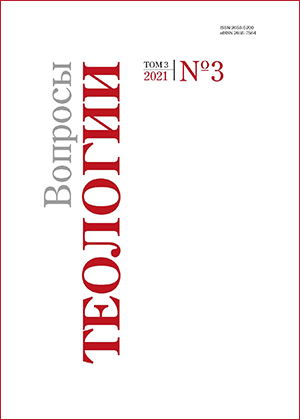The problem of understanding liturgical texts and its solution on the example of Gregory of Corinth’s exegesis
DOI:
https://doi.org/10.21638/spbu28.2021.303Abstract
The orthodox liturgy was finally established during the 8th and 9th centuries. The two stepbrothers and eminent Byzantine poets St. Cosmas of Maiuma and St. John of Damascus greatly contributed to its development. They composed the majority of the irmi and troparia that are still performed during the liturgy today. During their lives, however, worshippers were facing certain difficulties in understanding the meaning of church odes. This is also true today when orthodox liturgy occasionally becomes an obstacle on the path to God for the worshippers. Greater efforts are also required in order to understand the liturgy and this is not always easy. One of the reasons for this is an incorrect translation of many odes into Russian and Slavonic. Comments from 12th century Byzantine writers and poets can help us clarify their meaning. Gregory of Corinth and his 23 commentaries on the liturgical canons are particularly noteworthy. In the current article, a philological analysis is conducted of two complex, “obscure” and unclear passages from the Canon of Pentecost. At the same time, Metropolitan Gregory’s exegeses of these extracts, which can help us better understand the meaning not only of these passages but also of the whole celebration, are cited.
Keywords:
translation, church odes, poetic texts, Church Slavonic, Greek language, syntactic calques, exegesis of liturgical texts
Downloads
References
Antishkin A. V. (2019) “Epigrams of metropolitan Gregory of Corinth”, in Vestnik Ekaterinburgskoi dukhovnoi seminarii, no. 4 (28), pp. 99–109. (In Russian)
Bogiatzides J. K. (1912) “Gregor metropolitan of Corinth”, in Byzantinische Zeitschrift, vol. 21, pp. 145–149.
Chabrov I. V., ed. (2015) Lithurgical canons in Greek, Slavonic and Russian published by Loviagin E. I. 4th ed. revised. Мoscow, Praktika Publ. (In Russian)
Dvoretskii I. Kh., Sobolevskii S. I., eds (1958) Ancient Greek — Russian dictionary: almost 7000 words. In 2 vols. Moscow, GIS Publ. (In Russian)
Gregorio di Corinto. (1995) Esegesi al canone giambico per la Pentecoste attribuito a Giovanni Damasceno. Ed. F. Montana. Pisa, Giardini Editori e Stampatori.
Krumbacher K. (1897) Geschichte der byzantinischen Literatur. München, C. H. Beck Publ.
Liddell H. G., Scott R. (1996) A Greek-English Lexicon. Oxford, Clarendon Press Publ.
Nicodemus the Hagiorite. (1836) The Eortodromion or Commentary on the Canons of the Dominical and Marian Feasts. Venice. (In Old Greek)
Robins R. H. (1993) The Byzantine Grammarians: Their Place in History. Berlin; New York, Mouton de Gruyter Publ.
Skaballanovich M., ed. (1916) Christian holidays. Pentecost. Kiev, Propovednicheskii listok Publ. (In Russian)
Vasilik V., deacon (2020) “On the second canon of Pentecost”, in Pravoslavie. Available at: https://pravoslavie.ru/47003.html (accessed: 17.09.2020). (In Russian)
Vereshchagin E. M. (2010) “‘The Word was to God’: higher meaning or nonsense? On the amphibolic function of the religious text”, in Uchenye zapiski Kazanskogo gosudarstvennogo universiteta. Gumanitarnye nauki, vol. 152, iss. 2, pp. 161–163. (In Russian)
Downloads
Published
Issue
Section
License
Articles of "Issues of Theology" are open access distributed under the terms of the License Agreement with Saint Petersburg State University, which permits to the authors unrestricted distribution and self-archiving free of charge.




